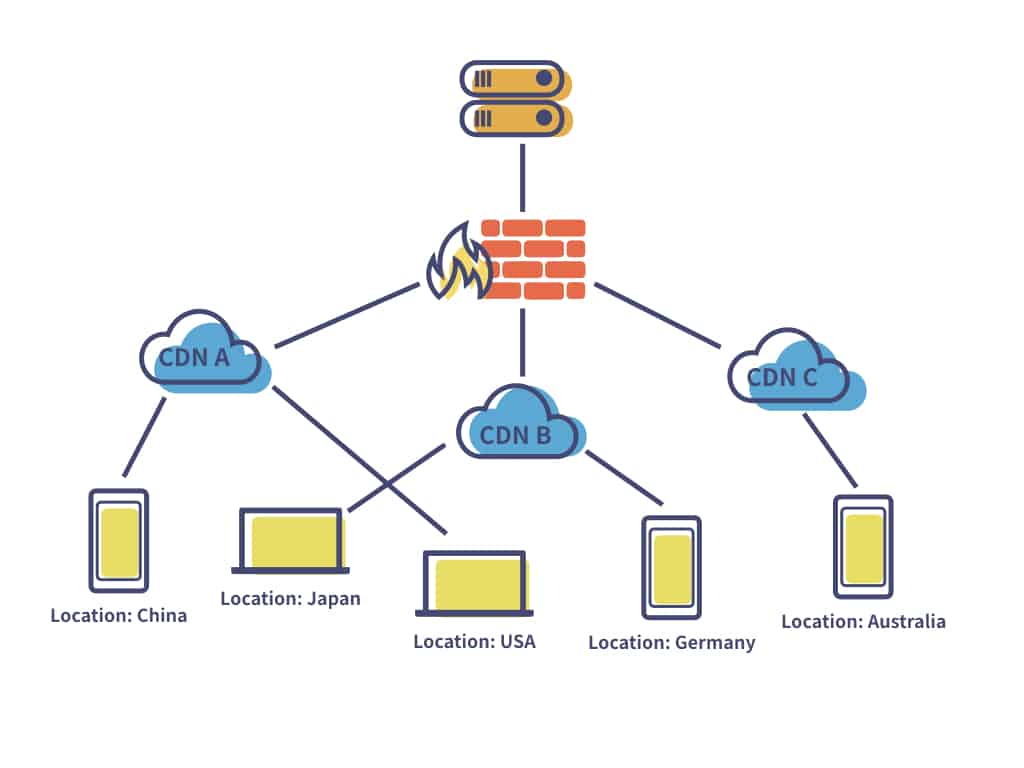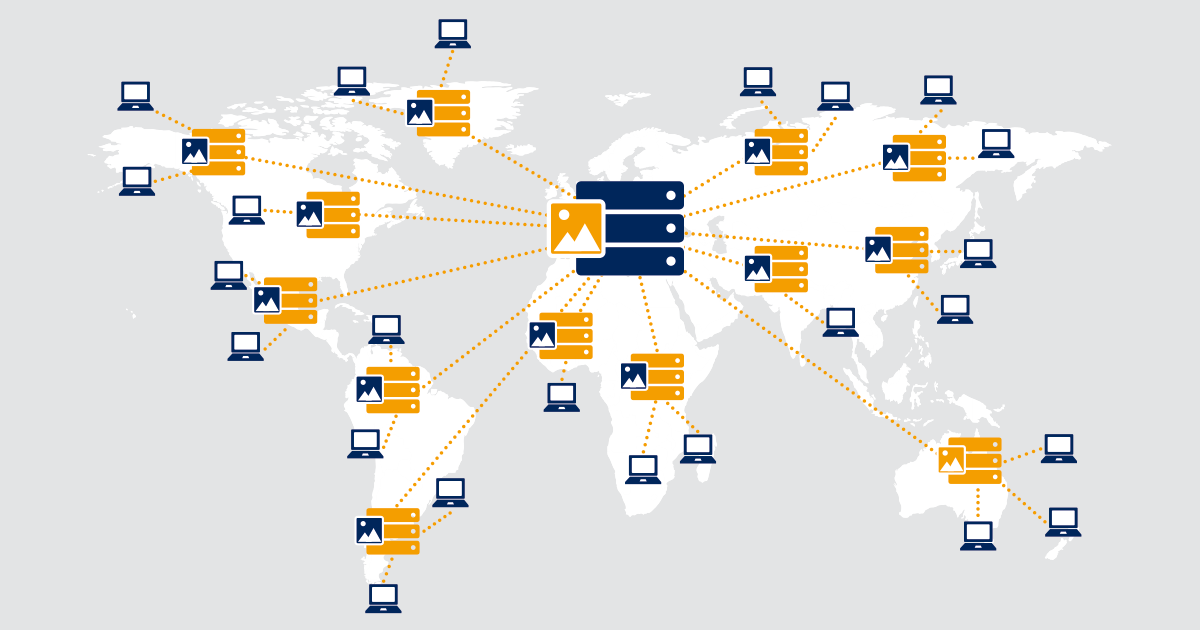When it comes to running a successful website, speed is everything. Slow-loading pages can frustrate users and lead to high bounce rates, which ultimately impacts your website’s ranking and conversion rates. One effective way to improve your website’s speed is by utilizing a Content Delivery Network (CDN).
A CDN is a global network of servers that store static files of your website, such as images, JavaScript, CSS files, and more. When a user visits your website, the CDN serves these files from the server nearest to their location, reducing the distance and time it takes for the content to load.
What is CDN?
Content Delivery Networks, or CDNs for short, are a network of geographically distributed servers and data centers. These servers are strategically placed in various locations worldwide. Their primary purpose? To deliver web content—such as images, videos, scripts, and other assets—quickly and efficiently to users, no matter where they are on the planet.
Imagine you’re trying to access a website hosted on a single server located in New York City. If you’re in New York, that’s fantastic—everything loads swiftly. But what if you’re in Sydney, Australia? Your request has to travel across oceans and continents to reach the server in New York and then journey back to Sydney with the content you requested. This can lead to frustratingly slow load times due to the physical distance involved.
Here’s where CDNs come to the rescue. CDNs have servers, often referred to as edge servers, dispersed in various locations worldwide. These edge servers store cached copies of web content. So, when you request a webpage, the CDN doesn’t send your request all the way back to the origin server in New York. Instead, it automatically directs your request to the nearest edge server, which then serves up the content. This proximity-based routing drastically reduces the time it takes for your request to reach a server and for the server to send back the content you want.
Think of it as ordering pizza from a local pizzeria rather than having it shipped from a restaurant on the other side of the city. CDNs ensure you get your digital pizza, aka web content, hot and fresh, no matter where you are.
How Does a CDN Work?
Imagine you’re trying to access a website hosted on a single server located in New York. If you’re in New York, great—everything loads quickly. But what if you’re in Tokyo, Mumbai, or Buenos Aires? Well, you’d be in for a slow and frustrating experience because your request has to travel all the way to New York and back, which can take a significant amount of time due to the physical distance.

Here’s where CDNs swoop in to save the day. They work by strategically placing multiple servers, often called edge servers, in various geographical locations, often in data centers. These edge servers store cached copies of the website’s content. So, when you request a webpage, the CDN automatically directs your request to the nearest edge server, not all the way back to the origin server in New York.
This proximity-based routing drastically reduces the time it takes for your request to reach a server and for the server to send back the content you requested. In simple terms, it’s like ordering pizza from a local pizzeria instead of having it shipped from across the country.
Benefits of using CDN for Website Speed
Using a CDN offers several advantages that can significantly enhance your website’s speed:
- Faster page load times
The main benefit of using a CDN is a noticeable improvement in your website’s loading speed. By serving static files from servers closest to the user, you can drastically reduce latency and provide a snappy user experience. - Improved website availability
A CDN employs server redundancy, meaning if one server fails, another server in the network can quickly serve the static content. This helps in ensuring your website is available to users even during server downtime or high traffic periods. - Global reach
With a CDN, your website can be accessed quickly by users from all around the world. No matter where your visitors are located, the CDN will deliver your content from the server nearest to them, eliminating the geographical limitations and reducing download times. - Reduced bandwidth costs
CDNs cache and compress your static files, thus reducing the amount of data that needs to be transferred from your origin server. This can lead to reduced bandwidth usage and lower hosting costs, especially for websites with high traffic. - SEO benefits
Website speed is a crucial factor for search engine rankings. By utilizing a CDN and delivering your content faster, you can enhance your website’s SEO performance, leading to better visibility and increased organic traffic. - Enhanced user experience
Fast-loading websites provide a better user experience. Users are more likely to stay and engage with your content if they don’t have to wait for pages to load. A CDN helps in delivering an enjoyable browsing experience, increasing user satisfaction and reducing bounce rates.
Why Are CDN So Important?
Now that we’ve got the basics down, let’s dive into why CDNs are crucial in today’s internet landscape.
- Faster Loading Times
CDNs significantly reduce page load times, improving the overall user experience. When websites load quickly, users are more likely to stay engaged and satisfied. - Global Reach
CDNs help websites reach a global audience by reducing the impact of geographical distance. Whether you’re in Sydney, London, or San Francisco, you’ll experience faster load times. - Scalability
Websites often experience traffic spikes, especially during events like product launches or breaking news. CDNs can handle this increased demand by distributing the load across multiple servers. - DDoS Mitigatio
CDNs can act as a shield against Distributed Denial of Service (DDoS) attacks by absorbing and mitigating the attack traffic before it reaches the origin server. - Enhanced Security
Many CDNs offer security features like Web Application Firewalls (WAFs) and Secure Sockets Layer (SSL) encryption, helping protect websites and user data. - Lower Bandwidth Cost
CDNs can reduce the amount of data transferred from the origin server, potentially saving on bandwidth costs. - Improved SEO
Faster-loading websites tend to rank higher in search engine results. Google, for example, takes website speed into account when determining search rankings.
Who Uses CDN?
CDNs aren’t limited to just big corporations. They’re used by a wide range of entities, including:
- E-commerce Websites
Online stores rely on CDNs to ensure fast and reliable shopping experiences for customers. - Media Streaming Services
Platforms like Netflix and YouTube use CDNs to stream video content seamlessly. - News Websites
Rapid content delivery is crucial for news sites, especially during breaking news events. - Gaming
Online gaming companies leverage CDNs to reduce lag and deliver game updates efficiently. - Cloud Services
Cloud providers use CDNs to deliver cloud-based applications and services to users globally. - Bloggers and Small Businesses
Even individuals and small businesses can benefit from CDNs to improve website performance.
Common CDN Providers
Several CDN providers offer a range of services tailored to different needs. Some of the most well-known CDN providers include:
- Akamai Technologies
A pioneer in the CDN industry, Akamai boasts a vast network of servers around the world. - Cloudflare
Known for its security-focused CDN services, Cloudflare offers a suite of performance and security solutions. - Amazon Web Services (AWS) CloudFront
Integrated with AWS, CloudFront is a popular choice for businesses already using AWS services. - Fastly
Known for its real-time caching and instant purging capabilities, Fastly serves content rapidly. - KeyCDN
A cost-effective option for smaller websites and businesses.
Conclusion
A Content Delivery Network (CDN) is a valuable tool for improving your website’s speed and performance. By utilizing the global network of servers, a CDN can significantly reduce latency, improve availability, and optimize the delivery of your static files. With enhanced website speed, you can provide a better user experience, boost your SEO rankings, and drive higher conversion rates. Don’t underestimate the importance of a fast-loading website, and consider integrating a CDN to level up your website’s speed today!













